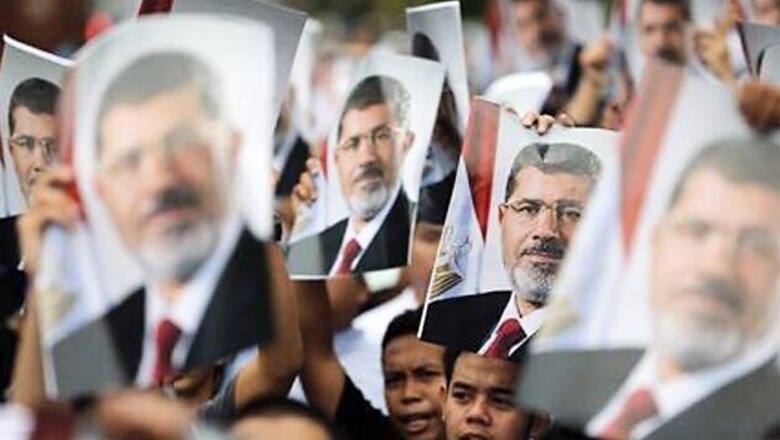
views
Cairo: Egypt faced the prospect of fresh bloodshed on Thursday after the country's army-backed rulers signalled they would move soon to disperse thousands of supporters of deposed Islamist President Mohamed Morsi. With no sign of a negotiated end to weeks of violent confrontation, Egypt's interim government said two Cairo vigils by Morsi supporters posed a threat to national security, citing "terrorism" and traffic disruption.
It ordered the Interior Ministry to take steps to "address these dangers and put an end to them," but gave no time frame. The announcement set up a showdown with the Muslim Brotherhood, which refuses to leave the streets until Egypt's first freely elected president is reinstated. Deposed by the army on July 3, Morsi remains in military detention at a secret location.
A move against his supporters could bring a new round of bloodletting after security forces shot dead 80 Brotherhood followers at dawn on Saturday and plunged the Arab world's most populous nation deeper into turmoil. The crackdown, coupled with criminal probes against Mursi and other Brotherhood leaders, has fuelled global concern that the military plans to crush the Islamist movement, which spent decades in the shadows before winning power in repeated elections after a 2011 uprising toppled autocrat Hosni Mubarak.
The fate of the Egyptian Brotherhood could shape that of Islamists across the Middle East at a time of transformation after a wave of popular revolts since 2011. Wednesday's announcement appeared to undercut efforts by the European Union to negotiate a peaceful settlement.
The bloc's foreign policy chief, Catherine Ashton, spent two days in Cairo this week, becoming the first outsider to see Mursi when she was flown after dark by military helicopter to his secret place of confinement.
EU envoy Bernadino Leon was in the Egyptian capital on Wednesday to press the mediation effort, and German Foreign Minister Guido Westerwelle was due to hold talks there on Thursday. Thousands of Brotherhood supporters are camped out behind volunteers they say are armed only with sticks and shields to keep order.
The interim government says the protesters have guns. The Brotherhood accuses security forces of whipping up trouble to justify a crackdown, and vowed to resist any attempt by the security forces to disperse the camps. "They tried to do that twice and they failed," said spokesman Gehad El-Haddad. "They killed 200 protesters. Do they want to try that again?"
The Brotherhood's allies called for a "million-man march" on Friday. Haddad said EU envoy Leon had visited the main vigil, on a square outside Rabaa al-Adawiya mosque in northern Cairo, on Wednesday. "This military coup is not accepted by a large segment of society," Haddad said. "I think he (Leon) got the message."
Almost 300 people have been killed in weeks of violence since the army deposed Mursi, inspiring fears in the West of a wider conflagration in Egypt, which straddles the Suez Canal and whose 1979 peace treaty with Israel makes it a vital factor in Middle East stability.
The United States, which supports the Egyptian military with $1.3 billion a year in aid, urged security forces to respect the right to peaceful assembly. Two senior Republican senators plan to travel to Cairo next week.
The Brotherhood has spurned an army "road map" to elections and what the military promises will be a return to civilian rule. Rights group Amnesty International called the cabinet decision to clear the camps "a recipe for further bloodshed" and a "seal of approval to further abuse."
Heba Morayef, Egypt director for Human Rights Watch, said: "They've set something in motion."


















Comments
0 comment